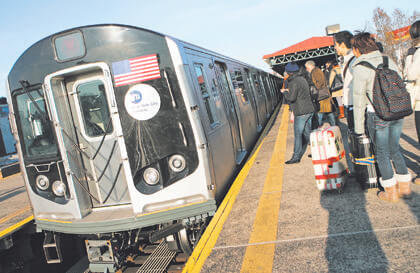By Philip Newman
The shouts of protest and predictions of chaos for commuting multitudes thwarted by a crippled transit system have begun from Flushing to Staten Island and from Brooklyn to the Bronx.
It is the Metropolitan Transportation Authority’s time to listen to the public before voting next month on perhaps the most far-reaching service cuts in the system’s history.
Gene Russianoff, attorney for the transit advocacy agency Straphangers Campaign, said it was important for transit riders to speak out publicly against the cutbacks.
“I know there is some skepticism about whether protesting makes a difference, but each of these bus and subway lines has a human constituency and when people talk about how their way to work is vital to their making a living, it can be moving. In the past, we beat back the ‘doomsday’ cuts of 2009.’’
“An unprecedented level of detail was made available in early January on amended changes for public view and now MTA officials and board members want to hear from the public before voting on these measures.” Russianoff said.
MTA Chairman Jay Walder, other transit officials and board members may indeed be eager to listen to straphangers, but the hearings are required by law before the board may vote on the cutbacks.
The hearings, one of which was scheduled to take place Tuesday night in Flushing, began Monday in White Plains, N.Y., and Carle Place, L.I.
The MTA has come under criticism for holding two hearings at the same time, reducing the number of MTA board members and officials who could attend. The hearings end with one session next Monday.
Critics of the transit agency have in the past called attention to what they said was a modest number of MTA board members showing up at the hearings.
Demonstrations have been held in various parts of the city, including one protesting proposed elimination of the W line and led by City Councilman Peter Vallone Jr. (D-Astoria) at the 30th Street subway station in Astoria Tuesday.
The proposed cuts as well as proposed elimination of more than 1,000 jobs in the MTA are because of a $750 million shortfall at the agency because of vastly reduced tax revenues and taxes from a 12-county payroll tax and cutbacks in state and city money for the transit agency.
The cuts in transit would include:
• shutdown of the M and W subways and shortening of the G,
• longer waiting times and more crowded cars on weekends and at midday on more than half of the subway lines,
• elimination of 10 express bus routes and combing of four other bus lines,
• $40 million in cuts in para-transit service for the elderly and disabled,
• eliminating free MetroCards for 600,000 schoolchildren,
• eliminating weekday service on 14 bus lines, weekend service on 22 other lines and ending overnight service on 18 routes and
• restructuring or replacing in part bus service on 41 weekday routes, 32 weekend routes and nine overnight routes.
Reach contributing writer Philip Newman by e-mail at timesledgernews@cnglocal.com or phone at 718-260-4536.



































